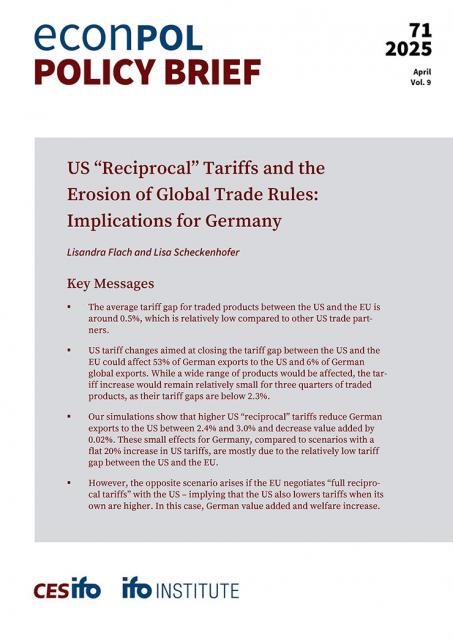News Archive

Digitalisation should be promoted, not taxed
|
Opinion
| News
A 3 percent tax on digital turnover, recently proposed by the European Commission, will stifle digitization in Europe and will only encourage other countries to take countervailing measures, says EconPol expert Clemens Fuest.
The Commission justifies the new tax with the observation that companies like Apple or Google sell their goods and services in Europe but pay almost no profit taxes here. This overlooks that current international tax agreements do not stipulate that companies pay profit taxes in the countries where they sell their goods. Profits should be taxed where these goods are developed and produced. In the case of the global internet giants, this is the US. Whether or not the US exercises its right to tax these profits is not a concern for the EU.
Countries where the goods are sold do collect value added tax. Europe could of course try to change international tax rules. But that would mean it loses the right to tax the profits of its exporters - their profits would be taxed in China or the US.
Instead of introducing new digital taxes Europe should promote digitalisation and focus on creating a European internal market for the digital economy.
... Details

US China trade war and Europe: ‘If two quarrel, the third rejoices’
|
Opinion
| News
With Trump’s trade policies becoming apparent, China has emerged as enemy number one. Meanwhile, other trading partners – particularly smaller ones - are being pressured to introduce concessions with advantages for the US. A key question for the rest of the world is what economic fallout to expect from this trade war. EconPol researcher Daniel Gros suggests that the US will attempt to put similar pressure on the EU, but it is unlikely that this pressure will succeed. But with the US expected to pursue its policy of trying to isolate China with other smaller trading partners, the political and systemic costs of the Sino-US trade war could be considerable in the long run.
... Details

CAP Beyond 2020: Seven More Years of Money for Nothing?
|
Opinion | Working Paper
| News
The European Commission’s proposals for the post-2020 Common Agricultural Policy (CAP) are under discussion, and these cautious reform ideas have set the parameters for upcoming negotiations. CAP will continue to have a two-pillar structure of direct payments and rural development, with a seven-year budget of €365 billion. As before, almost three-quarters of the budget - €265 billion - is reserved for direct payments to farmers. However, ‘European added value’ must be urgently applied to CAP, say Friedrich Heinemann and Stefani Weiss, who summarise their recommendations to justify direct payments in their latest opinion piece for EconPol.
... Details

The Third Type of Inter-System Competition: Europe and the Rise of China
|
EconPol Opinion
| News
China’s economy continues to grow apace, creating a worrying new form of economic and political competition for Europe and the US. While private entrepreneurship and free pricing play a growing role in China, the state continues to control economic developments in many sectors and owns almost all of the banking system. Is Chinese state capitalism about to outperform market economies in science and technology? Will its role in developing and emerging economies reduce the influence of the West? Clemens Fuest, president of the ifo Institute and director of the Center for Economic Studies at the University of Munich, examines Europe’s ability to compete with this third type of inter-system competition.
... Details

EconPol Europe’s Annual Conference 2018 International Trade and Protectionism
|
Annual Conference 2018
| News
The impact of international trade and protectionism on the European economy will be examined at EconPol Europe’s annual conference on the 19 and 20 November, with a keynote speech by Jean-Luc Demarty, Director General for Trade at the European Commission. The challenges of EU trade policy making will be the focus of day one of the conference, discussed by a policy panel including Maria Åsenius (Head of Cabinet to Commissioner Malmström), Sébastien Jean (Director of CEPII), Bernd Lange (Chair of European Parliament’s Committee on International Trade), Andrea Montanino (Chief Economist, Confindustria) and Eckart von Unger (Senior Manager, BDI).
... Details
